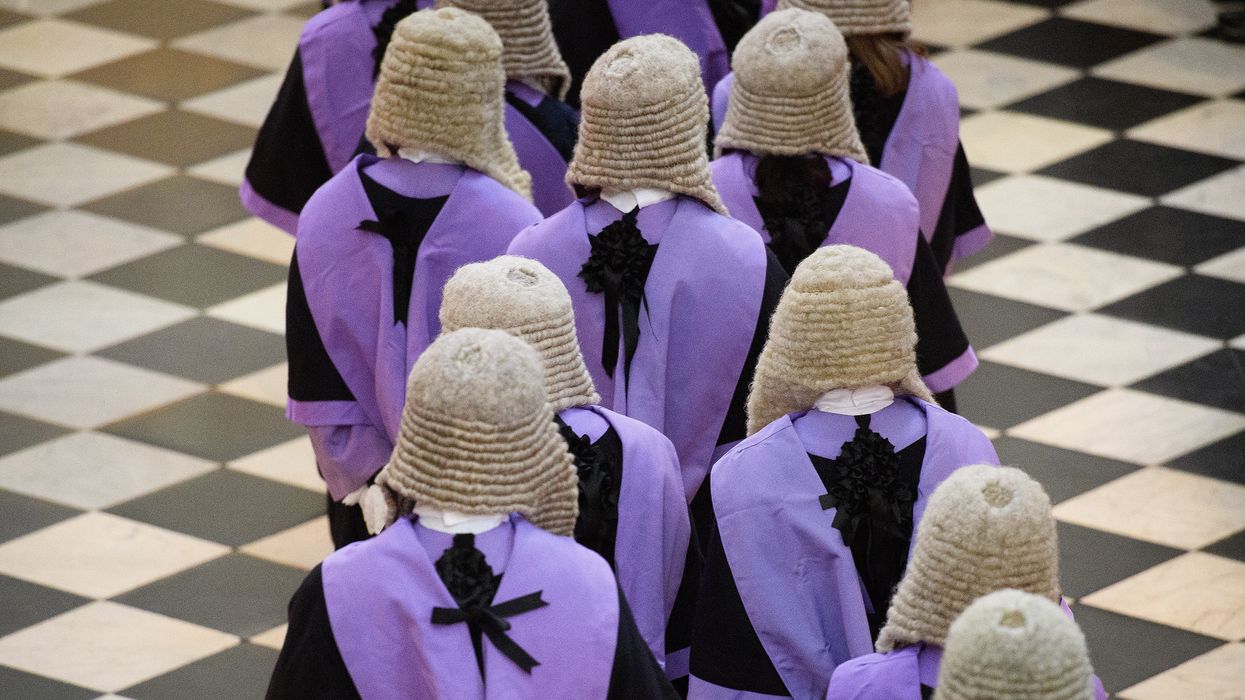A tribunal has ordered the body which appoints judges in England and Wales to disclose records it refused to give to Eastern Eye.
The decision is a major victory for press freedoms because it forces the Judicial Appointments Commission (JAC) to become more open and transparent.
In June 2023, this journalist asked the JAC for a series of documents under the Freedom of Information Act (FOIA).
The JAC refused and, in the panel’s view, the Information Commissioner’s Office (ICO) wrongly supported some of its decisions.
This left Eastern Eye no option but to appeal to a legal body known as the first-tier tribunal (FTT).
The panel said no to eight of the 10 things that we asked for, but it found in favour of two significant points.
District Judge Rachel Watkin ordered that, “By 5pm on 16 May 2025, the JAC must disclose the following information held by it.
“All situational and other questions, specimen answers and the scoring framework utilised in the following exercises:
“[T]he Deputy High Court selection exercises for 2021, 2022 and 2023.
“The Specialist Circuit Judge selection exercises held in 2021, 2022 and 2023.
“Communications leading to the retirement of Dr Jarvis.”
Dr Richard Jarvis was the JAC’s chief executive until he left on 16 June 2023.
JAC rebuke
In 2023, Eastern Eye, using freedom of information requests, discovered that the JAC had been wrongly using an exemption to the act.
That prevented the public from obtaining material it asked for because the JAC did not have a so called ‘qualified person’ to make that decision.
Indeed, Eastern Eye learnt that it was not until 27 September 2022 that a minister agreed to give Jarvis the power to use what is called a section 36 exemption.
The ICO decided that this apparent oversight did not matter, something which alarmed some judges and this newspaper because they said it was clearly in the public interest.
That became clear when a south Asian former judge in England, Abbas Mithani, used evidence gathered by Eastern Eye using freedom of information requests in his own court case against the JAC.
“I find it very striking that the judgment is highly critical of the Judicial Appointments Commission,” said FOI expert, and author of Freedom of Information: A practical guidebook, Martin Rosenbaum.
“It's extremely rare for an information rights tribunal to accuse the head of a public authority of being irrational and making a decision that could not have been made by any reasonable person.
“That is a very powerful judicial rebuke for the behaviour of a public body, and the JAC needs to take notice.”

Press scrutiny
Eastern Eye took legal action because previous freedom of information requests produced astonishing revelations, including the JAC spending large amounts of public money to defend complaints from unsuccessful candidates.
We discovered that between 2019 and May 2023, the commission spent almost £212,000 of public money on legal fees fighting such complaints.
“This judgement is important for journalists and journalism,” remarked Eastern Eye’s executive editor, Shailesh Solanki.
“We’re the voice for south Asian communities, and our job is to hold power to account on their behalf and others, ensuring a level playing field for all the ethnic groups we serve.
“We act in the public interest to make sure taxpayer funded organisations are open and transparent.
“That means using every legal device available to us to shine a light on how public bodies spend taxpayer pounds.”
In that vein, Eastern Eye wanted to discover, on behalf of its readers, how many times the JAC used the section 36 exemption without proper authority.
We also wanted the legal advice given to the JAC because that would explain why and how it failed to have the proper authority for a substantial period.
But the FTT panel refused this request.
Emails obtained by Eastern Eye under FOI requests show the confusion in the organisation as it scrambled to find answers to obvious questions.
“This is important because the JAC used the FOIA wrongly, it didn’t have the proper authority,” said one anonymous south Asian judge.
“It may appear to be a technicality, but the information commissioner shouldn’t have dismissed your appeal so casually.
“The ICO is supposed to make sure that public authorities abide by the law and not acknowledging or warning them bring into question its independence and fitness to act as a regulator.”
Transparency
Eastern Eye’s position is that if the public pays for a service, then it is entitled to know what those leading the organisation are paid, and the conditions of their service.
We also argue that our readers, many of whom are aspiring judges, should know the ethnic split of candidates, and how far they succeeded in the competition.
That, we contend, would provide a level of transparency to demonstrate the fairness and equality of the process.
“You’re asking all the right questions,” said another anonymous judge, “because if across a year, say, 200 people apply, 10 per cent of which are ethnic minorities and only one candidate of colour of the 200 is selected, surely, we need to ask, why is there such a high failure rate?
“Think about it, if the JAC aren’t interrogating those figures, how do they know they’re not at best unconsciously biased and at worst racist?
“How do we know that the systems, processes and structures aren’t broken?
“In my honestly held opinion, based on people I’ve spoken to and witnessed, the JAC’s recruitment process is corrupt.
“We’ve spoken previously about secret soundings, and how candidates are blackballed by people who don’t know them because they don’t belong to an elite almost all-white club.”
Eastern Eye has written extensively secret soundings, including how judges have been taught to fail candidates they do not want to join their ranks without the applicants being allowed to know their accuser.
Possible appeals
But the decision by the panel to force the JAC to give up records regarding how Jarvis left the organisation is also important for press freedoms.
“Here’s a man who didn’t have ministerial authority to prevent the public from getting information of legitimate and public interest,” said one south Asian judge.
“We don’t know how much or if that was a crucial reason in his leaving.
“Is there a smoking gun which says he screwed up so badly his position was untenable, in other words was he pushed, or did he leave before the complaints came in?
“The public have a right to know whether we have people fit for public office.”
This judgement has huge implications for those who applied to the JAC in 2021, 2022 and 2023, said sources.
The JAC must provide the questions and specimen answers, according to the panel’s order.
This leaves the way for the potential for scores of appeals and complaints from candidates who were told they had failed the exercise.
“Imagine a candidate who was told they had failed,” explained one judge, “but when they see the specimen answer they realise it is incorrect, they could have grounds to appeal.
“All they need to do is to send the scenario to a law professor who can decide the points they should have made.
“That is why the JAC have been so secretive, because most importantly, these candidates can read their feedback and see if it tallies with the specimen answers and what they wrote.”

Chamchas
In the Mithani hearings, one of the reasons the JAC gave for refusing to make public the scenario details is that the same situations are repeated in various competitions.
But the tribunal heard that judges were sharing these scenarios with private firms who train candidates when they apply for a judge’s position.
Eastern Eye has been told that the JAC gives candidate around 45-minutes to study the exercise, and another 45-minutes to discuss their answer at interview.
“The problem remains,” said another south Asian judge, “one of independence.
“What your paper is doing is extraordinary – you’re drilling down into, little by little, whether the JAC is independent.
“They aren’t, pure and simple.
“It’s an open secret that they are told by civil servants and senior judges who to appoint to this exclusive club.
“If you are an ethnic minority, you know you need to curry favour and do as they tell you to stay in that club.
“You’re nothing more than a chamcha [sycophant], and that’s not being independent.”
Experts who have read the judgement have told Eastern Eye that parts are flawed and lack real analysis.
One current judge said, “It seems to be a case of ‘you said, the JAC said, and I think’
“That’s very poor, and you’ve got to question whether all your evidence was truly considered.”
Judges, past and present, have told Eastern Eye that they are growing increasingly concerned about the independence of the judiciary.
They pointed to the current argument between politicians and the Sentencing Council over its decision to ask for reports prior to the conviction of defendants of colour as a prime example of the erosion of judicial independence.
“It's of real concern that the JAC relationship with judicial management seems to have fallen away so far from the independence that was such an essential part of its purpose,” said one retired judge.
“The only independence it is interested in guarding now is immunity from scrutiny and from transparency
“It's not enough to let go a few middle managers and post holders who haven't been obeying the rules.
“There needs to be a change in ethos and a revision back to first principles.
“This is an important win for public accountability.”
Flawed decisions
Judges and expert commentators have also criticised the Information Commissioner’s Office for upholding flawed decision making by the JAC, now clearly identified in this judgement.
“The JAC should review its FOI processes and ensure that it does not adopt an obstructive approach in future,” said Martin Rosenbaum, FOI expert.
“Senior staff must change their mindset and attach more importance to transparency and scrutiny.
“It's absurd that it has to take nearly two years and a tribunal case to obtain information which a court rules should be openly available in the public interest.
“It's extremely disappointing that the ICO did not spot the serious flaws in JAC's case and so upheld JAC's position far too easily.
“The ICO staff should have pursued a more thorough and detailed examination of the issues.”
Eastern Eye approached the JAC and ICO for comment.
An ICO spokesperson said, “The commissioner has received the decision, noting the tribunal predominantly upheld the commissioner’s decision notices.
“We are reviewing the parts of the decision of which the tribunal disagreed with us.”




